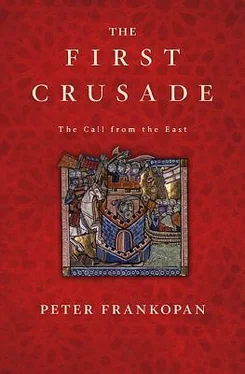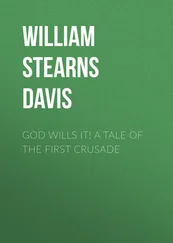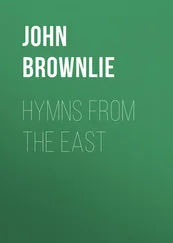After the embassy reached the Byzantine capital, matters quickly came to a head. On 16 July 1054, the papal legate, Cardinal Humbert of Silva Candida, along with other envoys from Rome, strode into the great church of Hagia Sophia in Constantinople as the Eucharist was being celebrated. In a moment of high drama, they walked directly up to the front of the church, not pausing to pray. Before the clergy and the congregation, they produced a document and brazenly placed it on the high altar. The patriarch of Constantinople, it read, had abused his office and was guilty of many errors in his beliefs and teaching. He was forthwith excommunicated, to suffer with all the worst heretics in hell, who were listed carefully. The patriarch and his supporters were condemned to eternal damnation, to suffer with ‘the Devil himself and his angels, unless they should repent. Amen, Amen, Amen.’ With that, Humbert turned around and walked out of the church, pausing to pat the dust from his sandals as he reached the doors of Hagia Sophia. He then turned to the congregation and declared solemnly: ‘Let God see and judge’. 16
This was the nadir in relations between Rome and Constantinople, to this day known as the Great Schism. The animosity between east and west now became almost institutionalised. In 1078, for example, Gregory VII issued a notice excommunicating Nikephoros III Botaneiates, even though the new emperor had not had any contact with Rome; three years later, the Pope did the same to Alexios I Komnenos after the latter deposed Nikephoros. 17Around the same time, the Pope not only sanctioned an attack on Byzantium, but issued its leader with a banner to carry into battle against the imperial army. He even went so far as to endorse Robert Guiscard, the architect of the assault, as the legitimate candidate for the throne of Constantinople itself, even though the Norman had neither a genuine claim nor a realistic chance of installing himself as emperor. 18
This puts Urban’s call to arms at Clermont into sharp relief. As the contemporary sources from late 1095 and early 1096 make clear, the Pope drew careful attention to the suffering of Christians in Asia Minor and to the persecution of the churches in the east – that is to say, the churches following the Greek rite. 19What led to this remarkable turnaround in the relations between Rome and Constantinople? The reasons for this extraordinary shift lay in the struggle for control of the church as a whole in the later eleventh century and, in particular, with the weakness of Urban’s position in the west.
When he became pope, Urban was keenly aware that he was being outmanoeuvred by Clement III and his protector Henry IV; he was forced to build bridges wherever he could. One of the first steps he took was to conciliate with Constantinople. Soon after his election in 1088, the Pope sent a small delegation to the imperial capital to discuss the sensitive topics that had provoked the fallingout three decades earlier. After being received by the emperor, they set out the issues in ‘a gentle and fatherly way’, as one contemporary commentator put it, covering topics such as the Greek use of leavened bread, as well as the removal of the Pope’s name from the holy diptychs of Constantinople, which contained the lists of the bishops, living and dead, considered to be in communion with the church. 20
The emperor, Alexios I, was a former general with spartan tastes and a no-nonsense approach to his faith – a man who stayed awake late into the night with his wife immersed in study of the Holy Scriptures, according to their eldest daughter. 21He listened to the Pope’s ambassadors and ordered a synod to be convened to discuss their grievances, which included the complaint that churches following the Latin rite in the capital had been closed down, thereby preventing westerners living in the city from worshipping. The emperor also personally presided over a meeting attended by the patriarchs of Constantinople and Antioch, two archbishops and eighteen bishops, and asked to see the documents relating to the decision to remove the Pope’s name from the diptychs. When informed that these did not exist, and furthermore that there appeared to be no canonical basis for the absence of the Pope’s name, he ordered that it be re inserted, according to custom. 22
Alexios went further. Through the envoys, the emperor urged the Pope to come to Constantinople to put an end to the disputes which had been so damaging to the church in the past. In a document stamped with the imperial gold seal, he suggested that a special council should be convened, made up of senior Greek and Latin clergy, to discuss the major areas of difference. For his part, the emperor promised to abide by the conclusions reached in order to achieve a united defin ition of the Church of God. 23
The patriarch of Constantinople, Nicholas III Grammatikos, then wrote separately to the Pope in October 1089, expressing his delight that Urban was keen to affect an end to ecclesiastical dispute. The Pope was wrong, Nicholas wrote politely, to think that the patriarch personally harboured animosity to Latin Christians. He was mistaken too to think that churches using the western rite in the capital had been closed; in fact, the westerners living in Constantinople were allowed to worship using the Latin rite. ‘We desire with all our heart, more than anything, the unity of the church’, Nicholas wrote. 24
These steps reopened dialogue with Rome and paved the way for a major realignment of the Byzantine Empire on the eve of the First Crusade. A senior Byzantine cleric, Theophylact Hephaistos, was commissioned to prepare a document deliberately playing down the significance of the differences between Greek and Latin customs to soothe misgivings in the Eastern Church. Many were petty, he wrote. Latin priests observed a fast on Saturdays, rather than on Sundays; they fasted incorrectly during Lent; unlike Orthodox priests, they thought nothing of wearing rings on their fingers, and also cut their hair and shaved their beards; they were not dressed in black while celebrating the liturgy but wore coloured silk vestments; they did not genuflect correctly; and unlike Greek monks who were strict vegetarians, Latin monks were only too happy to eat lard and various meats. All these issues could be easily resolved, the cleric argued, as could the question of leavening bread for use in the Eucharist. 25The filioque addition to the Creed was an altogether more serious problem, he acknowledged, and those who accepted the clause would descend into the flames of hell. 26Nevertheless, he was still hopeful that the clause would be removed. 27
This careful repositioning was intended to close the gap between Constantinople and Rome, not just in religious affairs, but to pave the way for a political and even a military alliance. It was a crucial staging post in the genesis of the First Crusade, and a prerequisite for the Pope’s appeal to the knighthood of Europe to march to Byzantium’s defence just a few years later.
Urban reacted quickly to the positive signs from Constantinople. He travelled south to meet with one of his few supporters, Count Roger of Sicily, and seek his approval for improving links with Byzantium. Roger had long been concerned by Henry IV’s aggressive intervention in Italy. In the mid-1080s some of the German emperor’s supporters had called on Henry to advance to Constantinople and then to Jerusalem where glorious coronations would await him; along the way he should also establish himself over the Normans by taking control of Apulia and Calabria, the latter at Roger’s expense. 28Roger gave an unequivocal reply when he heard about Alexios’ invitation to hold a council to mend relations: the Pope should attend, and rid the church of the Great Schism. 29
This was exactly what Urban wanted to hear: it gave him the chance to take on the role of unifier of the Church. In the context of his struggle with Clement III, Urban’s breakthrough was invaluable – and Clement knew it. The latter found out about his rival’s exchanges with Constantinople from Basil of Calabria, a hard-line Byzantine cleric who had become disaffected by being prevented by Urban from taking up his see in southern Italy. Basil had been present at the Council of Melfi in the autumn of 1089 when it was made plain that he would be installed in Reggio if he recognised the Pope’s authority. Appalled to see two of his colleagues do just that, Basil exploded with fury. 30In his eyes, Urban was unworthy of the office of pope, just like his ‘three times cursed’ predecessor Gregory VII. He wrote to the patriarch of Constantinople describing the Pope as a cowardly wolf who ran away when faced with the most basic questions about Christian doctrine. He was a heretic who had also taken to selling ecclesiastical offices to the highest bidder. 31
Читать дальше











